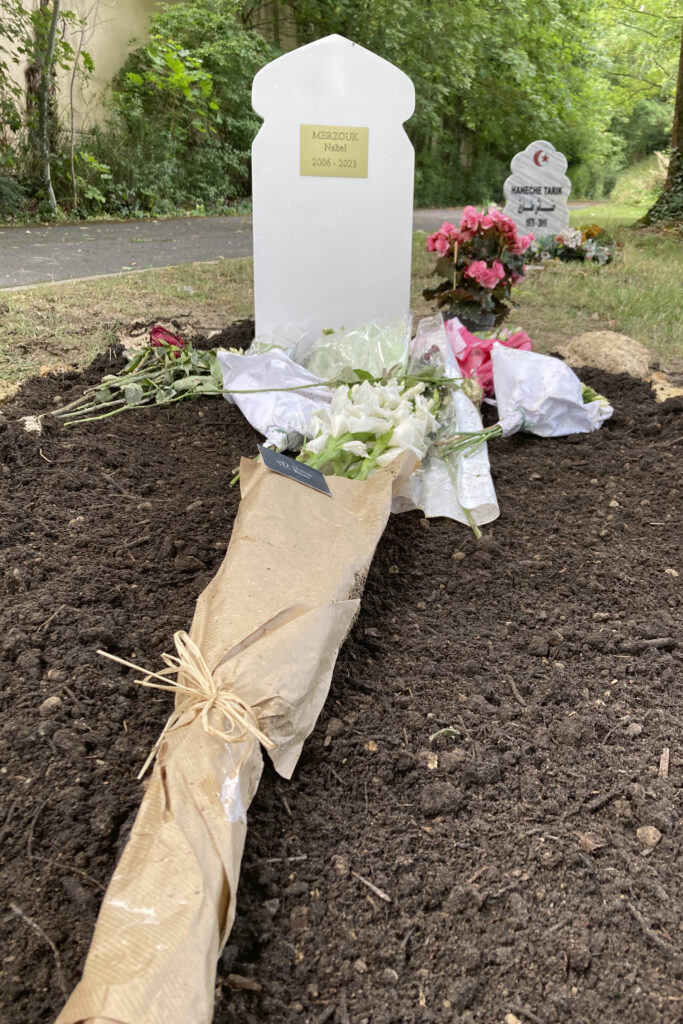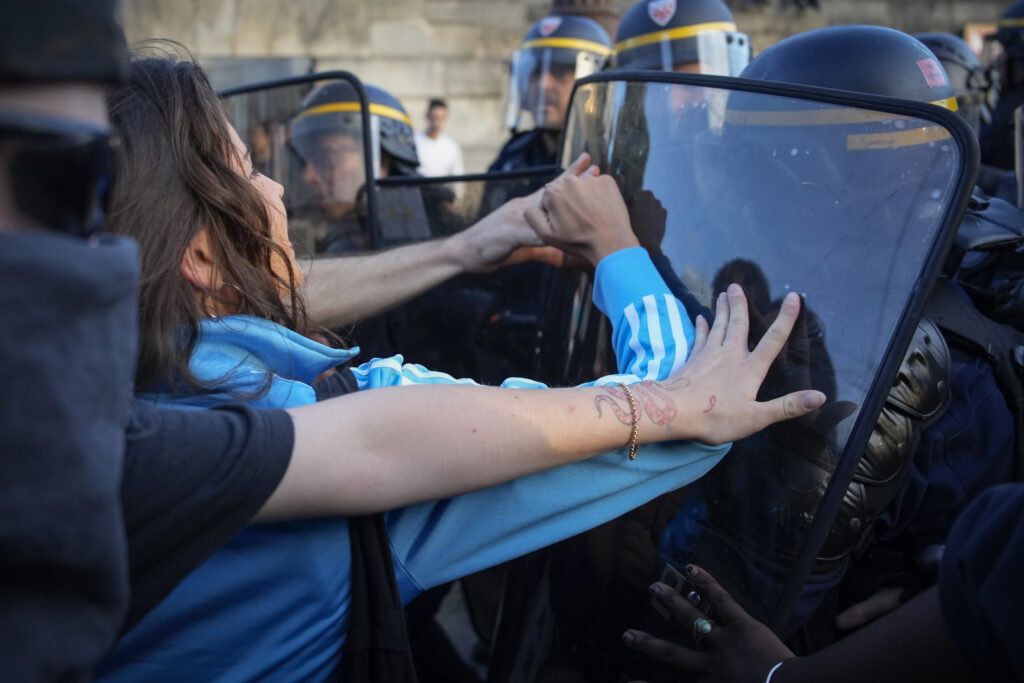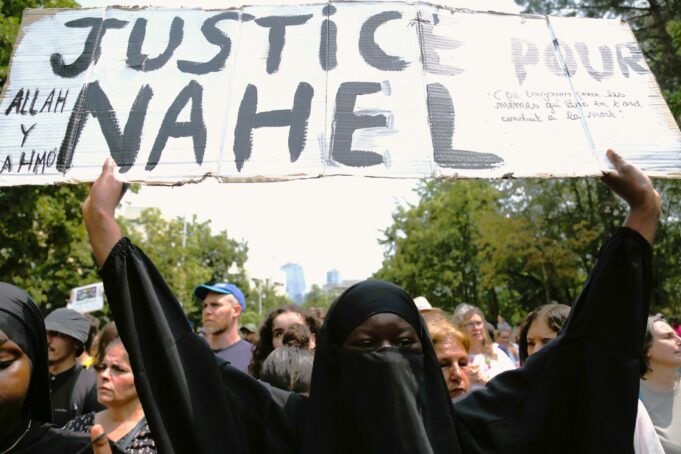Protesters in Paris, France, have crossed the proverbial Rubicon line of no return in anger triggered by the police killing of 17-year-old Nahel Merzouk, a French teen of Algerian descent, during a traffic stop that turned deadly. However, with a history of anti-immigrant sentiment, observers say perhaps it was France that crossed its point of no return because of unchecked racism and marginalization of Black and Brown communities.
“I think France has an ideological problem,” said Dr. Gerald Horne, author and professor of history at the University of Houston. “What I mean by that is, as a result of the French Revolution [in] 1789, this idea took flight that France had developed a so-called colorblind society,” he added.

Critics say the doctrine of “colorblind universalism” has hidden generations of systemic racism. The phrase “colorblind” is oftentimes invoked in the United States, noted the historian. But France takes it to an extreme in the sense that the state tries to avoid collecting statistics that might indicate French citizens of African descent are discriminated against. “And if you don’t count something,” stated Dr. Horne, “that means it doesn’t count.”
In interviews, French people of African descent said they feel doubly persecuted because of this misnomer that says they don’t face racism waxes against the fact that they do face racism, reasoned Dr. Horne. “And that makes it very difficult to confront,” he added.
Studies have demonstrated broad racial bias in French policing targeting Arab and Black people in particular. In 2020, France’s own human rights ombudsperson found that young men racialized as Arab or Black are 20 times more likely to be profiled and stopped by police.
The European Commission against Racism and Intolerance has warned of racial discrimination perpetrated by French police.
The UN rights office said it was time for France to reckon with its history of racism in policing.
“This is a moment for the country to seriously address the deep issues of racism and discrimination in law enforcement,” said Ravina Shamdasani, spokesperson for the UN High Commissioner for Human Rights, in a June 30 press briefing.
Nahel’s mother Mounia M. told France 5 television, she was angry at the shooter-officer, but not at the police in general. “He saw a little Arab-looking kid; he wanted to take his life,” she said.
Reacting to Nahel’s death, days of mayhem engulfed Paris and other areas with thousands arrested in a “David versus Goliath” scenario. Protesters were met with an army of 45,000 police unleashed by the government and armed with flash-balls, grenades and grenade launchers, water cannons, tear gas, t-batons, and firearms.
There were solidarity protests in the French Caribbean territories of Martinique, Guadeloupe and French Guiana, as well in Reunion, an island territory of France off the coast of East Africa.

The worst violence so far was in French Guiana, where authorities said police officers came under fire and a stray bullet killed a 54-year-old government worker on June 29 in the capital, Cayenne, reported AP.
Speaking to The Final Call from Guadeloupe, Pascal Archimede, a journalist with the Black-owned, Paris-based NOFI Media said the people who rose identified with the injustices in France. “Because you know, we also had different episodes that happened with the French government, and we don’t really get along with France,” Mr. Archimede said.
“We don’t really get along because we’ve got the feeling sometimes that we are the forgotten population of France … a second-hand citizen,” he said.
Mr. Archimede previously lived in France for 24 years before returning to his native Guadeloupe two years ago.
During unrests in France, businesses, schools and libraries were scorched. “It was a way for them to show their discontent,” Mr. Archimede said. “I’m not saying what they’re doing is good,” but “to them a way to express their discontent.” There is a generation of youth who are dissatisfied with France. “There is that kind of pressure or tension because those young people don’t feel like being French or being accepted as French,” he said.
The rage of backlash on the streets was birthed from years of frustration over a myriad of issues stemming from unabated racism, discrimination, and marginalization.
“Generations of African-French children are without education, excluded … they are clearly in an open war with the police specifically because of targeting,” said Darikatine X, a member of The Nation of Islam Study Group in Paris.
She told The Final Call via WhatsApp they were raised since childhood in an “illusion” that they could not prosper as a community based on race and religion. With a worsening economic situation in France, there is an awakening of people to realize the truth.
“This is a wakeup call for all of those who thought that France was an exception,” she stated. “We really though that!” and believed France was a “color-blind country.”
Generally, people have lost trust in the government, Darikatine X said.
A sordid history of bloodshed
Besides Guadeloupe, Martinique, and Réunion Island, France has a blood-stained history of colonialism, slavery and violence against people racialized as non-White in Haiti, North and West Africa and in Asia.
France ruthlessly repressed Algerian people in more than 100 years of colonization before its yoke was broken in the 1950s in a liberation struggle that killed upward of 1.5 million Algerians.
The current history of France’s anti-Black/Brown enmity runs deep, explained political analyst Jemima Pierre, of the Black Alliance for Peace. When France lost in Haiti, it invaded Algeria in North Africa and stayed there until the 1950s, she said.
“There’s that brutal, brutal, brutal history with North Africans in particular,” Ms. Pierre said. “So, it’s interesting it is this young Algerian kid that got shot.”

Ms. Pierre compared the uprisings to the George Floyd crisis in the U.S. in 2020. The police murder of Mr. Floyd ignited global outrage and protests. “They’ve been dealing with that for so long and this is the straw that got everybody like, this is it, we’re not having any more,” she said. “It’s the straw that broke the camel’s back.”
Initially citing police and undisclosed police sources, the French media described the June 27 killing as self-defense, claiming Nahel was shot after plowing his car toward officers to evade the traffic stop. But a viral video showed the cops were not in danger and an officer, identified as “Florian M” shooting point blank into the car, as Nahel drove off and slammed into barriers on Nelson Mandela Square. The officer was placed in prison on voluntary homicide charges after Pascal Prache, the Nanterre prosecutor of the area of the killing, determined “legal conditions for using the weapon” were “not met.”
Minorities living in poorer areas argue a young White man would never have been shot like that. The killing exposed cracks in the social veneer of France, which has long denied accusations of systemic bigotry. The killing exhibited the reality of a racist nation that deceitfully pushes “liberté, égalité, fraternité,” meaning “liberty, equality, fraternity,” as its national motto, say analysts.
Social, political dynamics of discrimination
Because of the landscape of France, people don’t realize that the U.S. has “so-called inner cities” which are “so-called ghettos,” and France has banlieues, “which are outer cities,” explained Ms. Pierre.
The U.S. poor are in the middle of cities, but France exercises a system of “out of sight, out of mind,” keeping the poor in the outlying suburbs, she said. These are French people who bear the brunt of racism and state violence.
Ms. Pierre told The Final Call that France benefitted from its “colorblind” policy by outlawing the category of race. The U.S., for example, collects racial data on what percentage of the population is Black or otherwise. France maintains it has no need for such data as a Republic that’s colorblind. “But their racism is not colorblind,” argues Ms. Pierre.
Critics contend the policy is tricknology, suggesting without actual facts and figures, they cannot do justice nor reparations for the marginalized.
That’s how France gets away with it “when in reality they’re racist as hell,” Ms. Pierre said.
Europe pretends at racial democracy and invests heavily to create this image. However, the troubles facing France and Europe represent the fall of White world power. With the European economy failing, war between Russia and Ukraine exacerbating the fall, it is catching it on all sides.
Amid the confusion is the growth of White rightwing ideologies who in times of economic downturn doubles down against Black and Brown people. This anti-immigrant, Black and Arab element is throughout Europe.
“Scratch a European liberal and you will find a fascist,” Ms. Pierre said. “You see that coming out now, going against Black and Brown folks.” She sees the troubles besetting Europe as karma for its history of violating Black life. “It’s just chickens coming home to roost and it’s about time,” she said.
In 2022 in the seaside town of Civitanova Marche, in Italy, the beating death of disabled Nigerian street vendor Alika Ogorchukwu by a White man was one of many racial incidents reported in that country, reported the BBC.
“In 2016 another Nigerian man, Emmanuel Chidi Namdi, was killed after defending his wife from racist abuse in the town of Fermo in central Italy. Two years later, a far-right extremist shot six African migrants in a drive-by attack in a town about 25km (15.5 miles) from where Mr Ogorchukwu was killed. When the police arrested him, he was wrapped in the Italian flag shouting ‘Viva l’Italia,’ telling police he wanted to ‘kill them all,’” reported bbc.com
According to the website of the group ENAR, “People of African descent experience widespread racism and discrimination across the EU and in all areas of life, including employment, education, policing and the criminal justice system. Recognizing and addressing Afrophobia as a specific form of racism that affects people of African descent and Black Europeans is essential to ensure their inclusion in Europe.”
According to the group’s website, ENAR is a pan-European anti-racism network.
Europe in a time of transition
The crisis in Europe signifies a time of reckoning and Divine judgment on the White world, warns the Most Honorable Elijah Muhammad and His student, the Honorable Minister Louis Farrakhan of the Nation of Islam. They warn from the scriptures that “every nation has a term” and a day when every man must return to his own nation.
“With the end of the rule of the white race over the Black people of earth in sight—face to face—we have to deal with each other according to the actual facts which exist between the two nations (Black and White),” Mr. Muhammad wrote in an article published in His illuminating book, “The Fall of America.”
“With the nature and desire of the White race to continue their rule and subjection of the darker people even though the White man recognizes these facts, he will continue to try holding onto his rule; his subjection; his thinking of what he has acquired under such rule—that which is his and he cannot give up the prey—his concession—the merchandise which he has exploited out from under the noses and eyes of the real owners (Black man),” wrote Mr. Muhammad.
Mr. Muhammad wrote although the Europeans are willing to shed their own blood and others to hold onto that which he calls his legal possessions, the spirit aroused in the Black man says, “No!” and that the continent and what is on and under its surface belongs to him and his people (the Black nation).
“Quoting Bible prophecy concerning the separation of nations, again today, as it was before: ‘Every man must go to his own.’ This is the clearest and most direct justice that God and man could agree upon,” Mr. Muhammad further wrote. “The white man cannot live in luxury unless he has the Black man and his place of possession in subjection of his will. But, as I repeatedly say in this paper and in all of my writings, ‘You cannot make God and His prophets liars,’ nor can we reverse the time of their prediction in which these things would take place. So the time has come,” Mr. Muhammad said.
“This is nothing but justice; that we have possession of what is our own,” He added.













